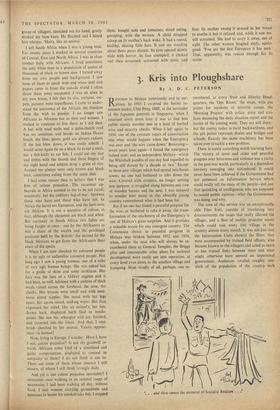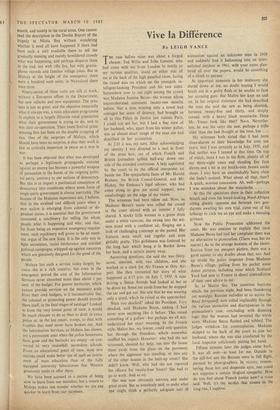3. Kris into Ploughshare
By A. D. C. PETERSON RETURNS to Malaya notoriously end in sur- prises. In 1945 I escorted the heroic re- sistance leader, Chin Peng, OBE, at the surrender of the Japanese generals in Singapore; when I returned seven years later it was to find him public enemy number one in a land of barbed wire and security checks. When I left again in 1954, one of the constant topics of conversation was what would happen when the Emergency was over and 'the wire came down.' Returning— seven years later again—I found the emergency indeed over, and an independent Malaya—which the Whitehall pundits of our day had regarded as being still distant by 'a decade or two.' Except in those new villages which had spread into boom towns, no one had bothered to take down the wire. Covered with creepers, no longer serving any purpose, it straggled along between one row of wooden houses and the next. I was tempted to wonder how many in this absurdly young country remembered what it had been for.
But if no one has found a peaceful purpose for the wire, or bothered to take it away, the trans- formation of the machinery of the Emergency is one of Malaya's great surprises. And it provides a valuable lesson for any emergent country. The Communist threat to peaceful progress in Malaya was broken between 1952 and 1954, when, under the man who will always be re- membered there as General Templer, the Briggs plan and innumerable other plans for national development were really put into operation, at every level even down to the smallest village and kampong. Most vividly of all, perhaps, one re- membered, at every State and District Head- quarters, the 'Ops Room,' the maps, with pin points for incidents or terrorist camps, the 'Morning Prayers' with police, army and civi- lians discussing the daily situation report and the tactics of the coming week. They are still there; but the enemy today is rural backwardness, and the pin points represent drains and bridges and schools. Exactly the same machinery has been taken over to tackle a new problem.
There is surely something worth learning here. The victory of sense and order and peaceful progress over bitterness and violence was a rarity in the post-war world, particularly in a dependent territory emerging into nationhood. It could never have been achieved if the Government had not possessed an Information Service which could really tell the mass of the people—not just that sprinkling of intelligentsia who are supposed to mould public opinion—what the Government was doing, and why.
The core of this service was an exceptionally able Film Unit, capable of translating into documentaries the issues that really affected the villager, and a fleet of mobile projector teams which could visit every tiny village in the country almost every month. It was not just that the Information Units showed the films; they were accompanied by trained field officers, who became known to the villagers and acted as more or less trusted links between them and what might otherwise have seemed an impersonal government. Audiences totalled roughly one- sixth of the population of the country each month, and mostly in the rural areas. One cannot read the description in the Devlin Report of the tragedy at Nkata Bay without wondering Whether it need all have happened if there had been such a unit available there to tell the gradually massing and mainly bewildered crowds What was happening, and perhaps disperse them in the end, not with rifle fire, but with gramo- phone records and familiar village jokes. But in Malaya at the height of the emergency there were a hundred such units; in Nyasaland there Were three.
Ninety-seven of these units are still at work, Without a European officer in the Department. but new vehicles and new equipment. The pres- sure is just as great, and the objective essentially What it always was, a mass education programme to explain to a largely illiterate rural population What their government is trying to do, and to win their co-operation. Their latest festival prize- Winning film has been on the double cropping of rice. One of the surprises of Malaya, which Should have been no surprise, is that their work is just as critically important in peace as it was in war.
It has been objected that what was developed as perhaps a legitimate propaganda exercise against an enemy has become a powerful weapon of persuasion in the hands of the reigning politi- cal party, contrary to our notions of democracy. But this is to import a puritanical conception of democracy into conditions where some form of single-party government is almost inevitable. The lessons of the Malayan experience arc, I believe, that in the strained and difficult years when a new nation is emerging from colonial or de- pendent status, it is essential that the government command a machinery for telling the whole people what is happening and why; and that, far from being an expensive emergency-require- ment, such machinery will prove to be an essen- tial organ of the new State. It is the only way to fight extremism, racial intolerance and suicidal Political campaigns, whipped up against measures Which are genuinely designed for the good of the people.
Malaya has such a service today largely be- cause she is a rich country; but even in the emergency period the cost of the Information Services never absorbed more than about I per cent, of the budget. For poorer territories, which cannot provide services on the necessary scale from their own budgets, is it inconceivable that the colonial or protecting power should provide them itself, in the final stages of tutelage? Looked at from the very lowest point of view, it would be much cheaper to do so than to draft in extra Police or, in the last resort, troops, to deal with troubles that need never have broken out. And the Information Services, as Malaya has shown, are a permanent asset when the police lieutenants have gone and the barracks arc empty—or con- verted to very makeshift secondary schools. From an educational point of view, most new nations could make better use of such an instru- ment of mass education than of the fully equipped university laboratories that Western generosity tends to offer them.
We have been accused as a nation of being Slow to learn from our mistakes; but a return to Malaya makes one wonder whether we are any quicker to learn from our successes:







































 Previous page
Previous page